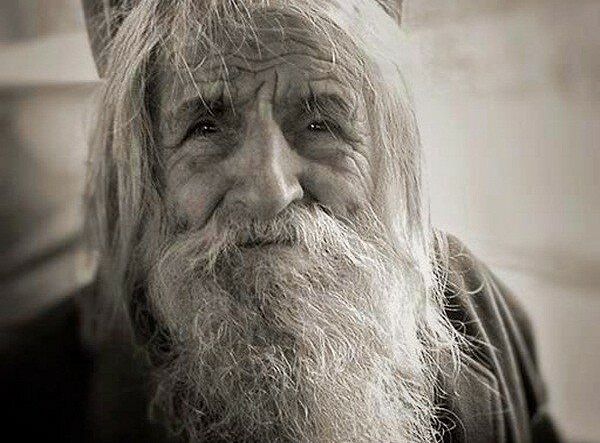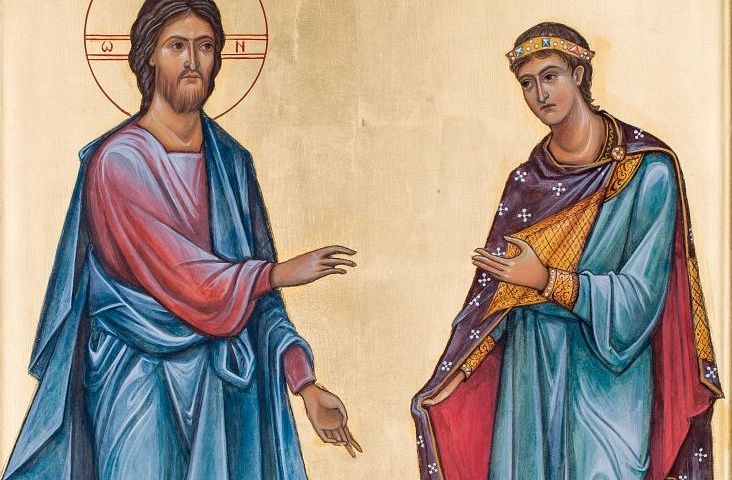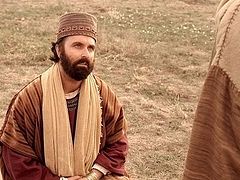 The holy beggar of Sofia, Elder Dobri Dobrev. Photo: yandex.net
The holy beggar of Sofia, Elder Dobri Dobrev. Photo: yandex.net
And, behold, one came and said unto him, Good Master, what good thing shall I do, that I may have eternal life? And He said unto him, Why callest thou Me good? there is none good but one, that is, God: but if thou wilt enter into life, keep the commandments. He saith unto him, Which? Jesus said, Thou shalt do no murder, Thou shalt not commit adultery, Thou shalt not steal, Thou shalt not bear false witness, Honour thy father and thy mother: and, Thou shalt love thy neighbour as thyself. The young man saith unto Him, All these things have I kept from my youth up: what lack I yet? Jesus said unto him, If thou wilt be perfect, go and sell that thou hast, and give to the poor, and thou shalt have treasure in Heaven: and come and follow Me. But when the young man heard that saying, he went away sorrowful: for he had great possessions. Then said Jesus unto His disciples, Verily I say unto you, That a rich man shall hardly enter into the Kingdom of Heaven. And again I say unto you, It is easier for a camel to go through the eye of a needle, than for a rich man to enter into the Kingdom of God. When His disciples heard it, they were exceedingly amazed, saying, Who then can be saved? But Jesus beheld them, and said unto them, With men this is impossible; but with God all things are possible (Mt. 19:16-26).
We hear the story about the rich young man, about the sadness of a man who is afraid to rely on God alone. This rich man has everything; one thing he lacks—grace. Is he not reminiscent of many of us who observe all the rules, keeping the statutes of the Church, honestly passing through life with strictness, and sometime, perhaps, even excessiveness in relation to ourselves?
At any rate, the rich man in the Gospel evokes sympathy. When Christ lists the commandments: Thou shalt not kill, thou shalt not commit adultery, thou shalt not steal, honor they father and mother, he answers: All these things have I kept from my youth up. As it says in the Gospel of Mark, Christ looked at him and loved him. But he made him an unprecedented offer. He proposed to him a complete break with his wealth—not only material, but also spiritual. It’s not that the Lord abolished the commandments in which life is found for him. On the contrary, He pointed to them as the sole path to perfection, that is, to love. But man cannot reach perfection himself by any effort. Christ suddenly offers this man, who was used to relying only on his own efforts and his own wealth, everything for nothing—all of His love, all of His perfection: “Leave everything and follow Me.”
We know that we cannot earn eternal life by any work, or podvig; no one can conquer death and sin, or become a partaker of the Divine nature and a temple of the Holy Spirit. Nevertheless, how often we are likened to one of St. Ignatius Brianchaninov’s correspondents, who was perplexed why she, having so carefully prepared for confession, having tried to live strictly and attentively, having named all her sins, including the very smallest ones, left the church empty, without joy. “It’s because,” the holy hierarch answered her, “you thought to settle all your debts with God all at once, while your debts can never really be repaid.”
Eternal life is to be with God, and this consists in knowing that Christ is God and following Him on the path of His commandments. All of the commandments exist for us to learn a personal relationship with God and man, that is—love; so God and man would be alive for us. “I have kept all of this,” says the young man, but his relationship with God and man is completely egotistical. He is captive to his property, both material and spiritual. He is in chains that need to be broken.
Eternal life is the life that Christ God lives. It is love and selflessness and sacrificial generosity. If we learn what eternal life is here, on Earth, that this peace and joy emanates from Christ, then we will gladly follow Christ. And we will understand that following Christ means to serve the people for whom He died.
Let each of us try to experience today what sorrow and what joy are in us, and what causes them. The rich man could not venture to sell off his riches, to separate himself from them. This explains the sadness with which he departed from Christ, head lowered. It is the sadness of one who was unable to accept the joy offered to him. Joy is given only to a poor spirit, only to those who humbly pray for grace, following Christ. The young man was saddened because he could not acquire perfection at his own heavy price, and refused to accept it at Christ’s easy price.
But if such a man dies, can we not but exclaim with all the disciples of Christ: Who then can be saved? This is impossible for man, Christ answers, but not for God, for everything is possible for God.” We should never despair. The Savior conceals mercy in these words towards the rich young man who departs from Him. It is not impossible for God to restore him. But there is one law: to sooner or later voluntarily leave it and accept the grace that is given.
The path to Heaven is narrow for all, and the gates leading to life are straight. It is easier for a camel, Christ says, to go through the eye of a needle, than for a rich man to enter into the Kingdom of God. Some believe He is talking about the gates in Jerusalem, known as “needle eyes” for their narrowness. A camel cannot pass through them until it is unloaded. Thus, a rich man cannot ascend to Heaven until he desires to pay off the burden of earthly riches and bow to the precepts of humble faith.
Others believe that it is no coincidence that the word “camel” in Greek coincides with the word “rope.” A rich man compared to a poor man is like a thick rope compared to a thin thread. It will not pass through the eye of a needle until it is split into separate threads. Thus the rich man should liberate himself from his riches so thread after thread can pass through the eye of the needle.
Where can we find the courage and self-sacrifice of those who left everything and went into the deserts or accepted a martyr’s death? Was it so long ago that our Church was on the cross, when everyone who was faithful to the Lord hoped only in grace, and, deprived of everything, had nothing, except treasure in Heaven? But everyone, without exception, is given death as the loss of everything or as the Pascha of the Lord.




